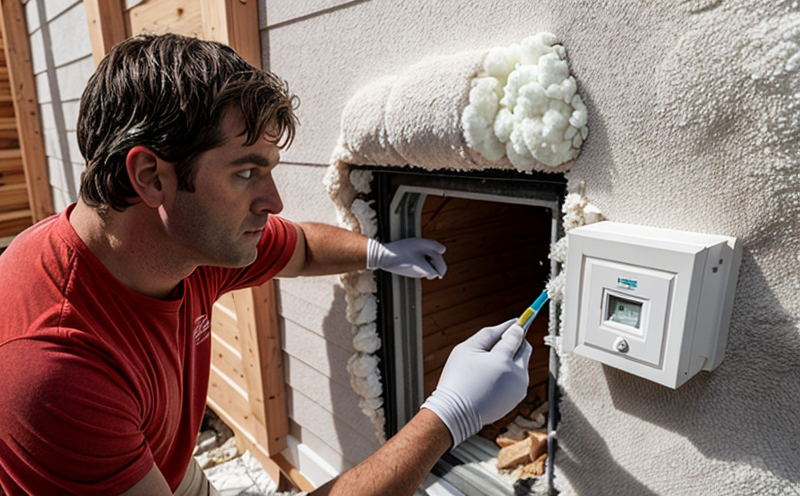ISO 8302 Heat Flow Measurement on Insulation
The ISO 8302 heat flow meter test is a fundamental method used in insulation and thermal performance testing. This standard provides an accurate means of measuring the thermal resistance (R-value) of insulating materials, which is crucial for ensuring that buildings meet energy efficiency standards and perform optimally under various environmental conditions.
The process involves placing a specimen between two plates maintained at different temperatures. The heat flow through the insulation is measured using calibrated thermopiles or electrical calorimeters. This method allows for precise determination of the thermal resistance, which is essential in validating compliance with building codes and industry standards.
Understanding the parameters involved in ISO 8302 testing is critical for achieving reliable results. Specimens are typically prepared according to the specifications outlined in the standard, ensuring uniformity across samples. The test apparatus includes a heat flow meter capable of maintaining precise temperature differentials between the top and bottom plates.
The measurement process itself involves careful calibration of the instrument and accurate positioning of the specimen within the apparatus. This ensures that any thermal resistance measured is attributed to the material properties rather than external factors such as air gaps or contamination. The results are then reported in terms of R-value, which indicates how well the insulation resists heat flow.
The importance of this test cannot be overstated, especially in sectors like construction and energy efficiency where thermal performance is a key consideration. By accurately measuring the R-values of insulating materials, builders can select products that meet or exceed required standards, thereby contributing to more sustainable and efficient buildings.
The ISO 8302 method has been widely adopted globally due to its robustness and reliability in providing consistent results across different laboratories. Compliance with this standard ensures that insulation products perform as expected under real-world conditions, reducing the risk of performance discrepancies once installed.
Why It Matters
The ISO 8302 heat flow measurement method is pivotal in ensuring the quality and reliability of insulating materials used in building constructions. Proper thermal insulation directly impacts energy efficiency, reducing heating and cooling costs while minimizing carbon footprint.
In the context of construction, accurate R-value measurements ensure that buildings are constructed to meet stringent energy codes and standards. This not only promotes sustainability but also enhances occupant comfort by maintaining consistent indoor temperatures without excessive energy consumption.
The reliability of insulation materials is critical for long-term performance and durability. By adhering to ISO 8302, laboratories provide accurate data that informs material selection and specification in building projects. This ensures that the chosen insulating materials perform consistently throughout their lifecycle, contributing positively to both environmental sustainability and economic efficiency.
The broader implications extend beyond individual buildings; when combined with other sustainable practices, ISO 8302 compliance helps drive a more resilient built environment capable of adapting to changing climatic conditions. This is particularly important in regions experiencing increased variability in weather patterns, where energy-efficient materials play an increasingly significant role.
Industry Applications
| Application Area | Description |
|---|---|
| Residential Construction | Ensuring proper insulation in walls, floors, and roofs to enhance energy efficiency. |
| Commercial Buildings | Optimizing HVAC systems through accurate R-value assessments of insulating materials. |
| Industrial Facilities | Evaluating thermal insulation in process areas to maintain optimal operating temperatures. |
| New Construction Projects | Meeting stringent energy efficiency requirements set by local and national regulations. |
| Retrofitting Existing Buildings | Evaluating the effectiveness of insulation upgrades to improve overall building performance. |
| Research & Development | Developing new insulating materials and processes through rigorous testing standards. |
International Acceptance and Recognition
The ISO 8302 heat flow meter test is recognized worldwide for its reliability and consistency in measuring thermal resistance of insulating materials. This standard is part of a broader suite of international standards that aim to harmonize testing methodologies across different jurisdictions, ensuring uniform results regardless of location.
Recognized by organizations such as the International Organization for Standardization (ISO), ASTM International, and others, ISO 8302 has become the gold standard for heat flow measurement. Its acceptance in global markets underscores its importance in the quality assurance process for insulating materials.
Countries around the world incorporate this method into their national building codes and regulations to ensure compliance with energy efficiency standards. This widespread adoption highlights the universal applicability of ISO 8302, making it a cornerstone in the global construction industry.
The international acceptance of ISO 8302 also fosters collaboration among professionals from various countries, promoting best practices and innovations in insulation technology. Laboratories that adhere to this standard benefit from standardized protocols, enhancing their credibility and reputation in both domestic and export markets.





